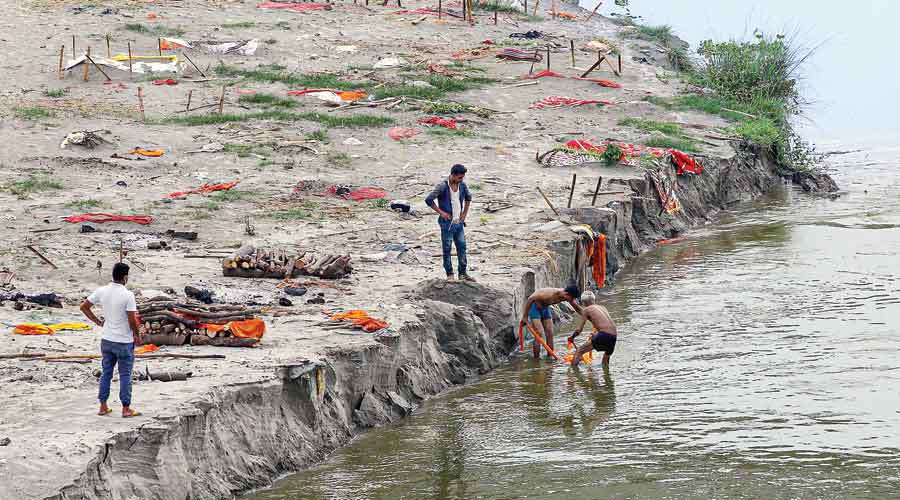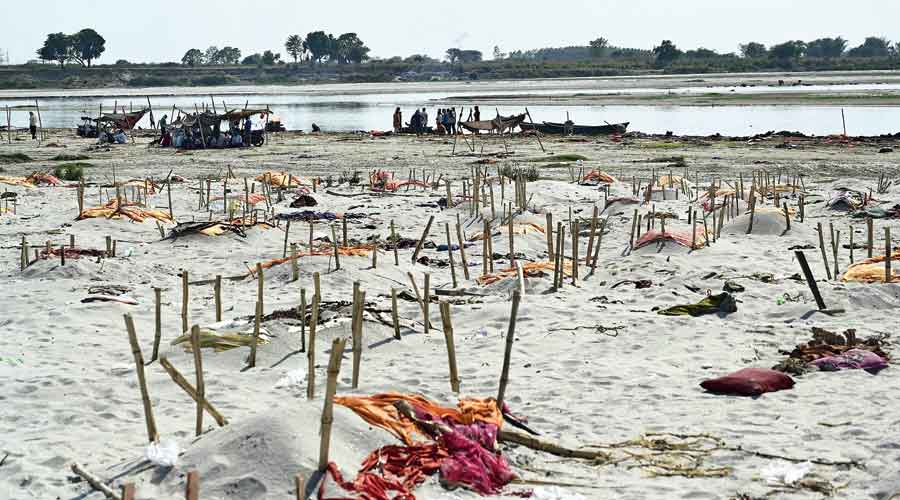An editorial published in the June issue of the Gujarat Sahitya Akademi’s official mouthpiece, Shabdsrushti, has created a massive uproar in the literary world of Gujarat.
Intellectuals from across Gujarat felt offended. More than 150 intellectuals from Gujarat have issued a joint statement condemning the editorial by Akademi chairman Vishnu Pandya and seeking its withdrawal.
The article in Shabdsrushti was unsigned but Pandya later confirmed writing it in a newspaper interview.
In the editorial, titled “No, this is not a poem, it is the misuse of a poem for anarchy”, Pandya described the poem he was alluding to as “pointless angst written in agitation”.
He also described the poet and the people who supported her or circulated the poem as “literary Naxals”. He did not name the poet or identify the poem but it was clear from reading his editorial that he was alluding to Parul Khakhar and her much praised poem Shav-vahini Ganga. (The Telegraph had published an English translation of the poem on May 19.)
Pandya wrote: “This poem is used by Leftists and so-called liberals to spread anarchy in the nation. It is misused by anti-Centre forces and people who are against the Centre’s nationalist ideologies.”
He called this a “conspiracy by such people whose commitment is not to India but elsewhere”.
“They are active in all fields and have now jumped into literature. The purpose of these liberals is to influence innocent people from society who would relate their own grief with this poem,” Pandya wrote.
“She has been a beneficiary of the Akademi in the past. Her poem is bad but the poet is good and readers would like to read more from her in future if she writes good again.”
It was a kind of directive by the chairman of the Akademi to Parul Khakhar as well as other writers about what to write and what not to write.
Pandya is known as a Right-wing journalist. He has also served as editor of the pro-RSS Sadhana.
He was awarded the Padma Shri in 2017 and appointed chairman of the Gujarat Sahitya Akademi the same year. He had during a TV debate in 2019 said: “Godse was a patriot and so was Gandhi.”
The joint statement by the writers and intellectuals says: “The anonymous writer makes outrageous statements such as ‘the poem is bad though the poet is good’, and through such insinuations attempts to issue an indirect threat to Gujarati writers indicating in an authoritative voice what they should write and what they should not write.”
It adds: “This is reminiscent of the time of the Emergency (during the Emergency in 1975 newspapers and journals had to be approved by government officials) and is absolutely condemnable. This is beating the pen with the hammer, a death knell for the right to the freedom of expression of Gujarati writers.
“Moreover, the accusation that this poem has encouraged anti-national ‘literary Naxals’ and destructive elements that are trying to create anarchy in the country, and are involved in anti-national activities by shooting from the poet’s shoulders, is extremely shocking.
“Through such accusations the anonymous writer attempts to create an atmosphere of hostility towards writers who engage in creative activity in a democratic manner and become the voice of contemporary times as well as towards the hundreds of thousands of readers of Gujarati literature who appreciate the writings of these writers.
“In an attempt to gag the glorious literary tradition of Gujarat, this government-controlled institution, which functions in a democratic structure, has opened the floodgates for a practice that goes against the interests of the people and has a dangerous and fascist tendency which we strongly condemn.
“We believe that to write poetry in a democratic tradition, to be a custodian of society through writing poetry, to debate contemporary issues, to criticise the actions or inaction of those in power through writing, is also an important part of a healthy democracy.
“Recalling what the Supreme Court said a few days ago that to criticise the government is not sedition, we appeal to the editor of Shabdsrushti, chairperson of the Gujarat Sahitya Akademi and the government of Gujarat to withdraw this writing which is a blot on the Gujarati language and Gujarat.”
The signatories to the statement include Mallika Sarabhai, Gulam Mohammed Sheikh, Indira Hirway, Ghanshyam Shah, Prabodh Parikh, Salil Tripathi, Svati Joshi, Prakash N. Shah, Saroop Dhruv, Kamal Vora, Sanjay Chhel and Jignesh Mevani, among others.
Parul Khakhar recently responded to the controversy. As a real poet, she chose to give her response in the form of a poem, titled Tare Bolvanu Nahi, which translates as “You should not speak”.
This poem got published in the June 16 issue of the Gujarati fortnightly Nireekshak.
Nireekshak is among the very few liberal spaces left in Gujarat, where progressive Gujarati minds express themselves. The June 16 issue carried a few articles as a response to the editorial by Pandya.
New York-based writer Salil Tripathi has written an article titled “Poetry and Anarchy”, condemning Pandya and his article.
He wrote: “Poet shows mirror to us which shows our real reflection.”
Prakash N. Shah, editor of Nireekshak and elected president of the 100-year-old Gujarat Sahitya Parishad who was imprisoned for 11 months during the Emergency, too has condemned it.
Shah has in his editorial mentioned Danish author Hans Christian Andersen’s famous story The Emperor’s New Clothes and drawn a parallel with the “naked king” mentioned in the Shav-vahini Ganga.
I wrote an article on the same issue, mentioning the support received by filmmaker Aisha Sultana from the Lakshadweep Sahitya Pravarthaka Sangam after the registration of the sedition case against her.
I tossed the question in my article whether the Gujarati community too would support Parul.
Mehul Devkala is a Gujarati poet and an award-winning filmmaker











